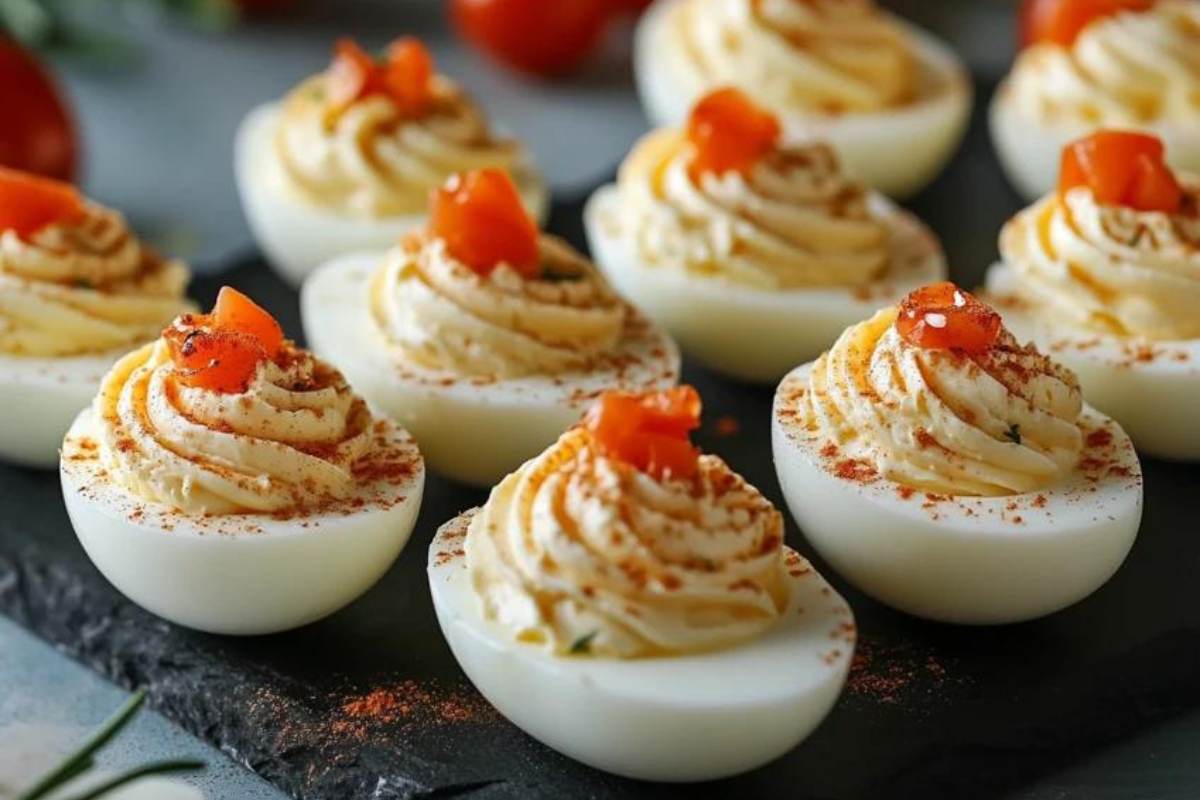Deviled eggs are a beloved appetizer that often graces tables during holidays, picnics, and gatherings. They are simple to make and can be a crowd-pleaser. However, a common question arises: Is it better to make deviled eggs the day before or on the day of serving? In this article, we’ll delve into the advantages and disadvantages of both approaches to help you decide which is best for your next event.
The Case for Making Deviled Eggs the Day Before
Convenience
One of the primary benefits of preparing deviled eggs a day in advance is the convenience it provides. Here are some key points to consider:
- Save Time: By prepping the eggs ahead of time, you free up valuable minutes on the day of your gathering, allowing you to focus on other tasks(Allrecipe)(Southern Living).
- Reduced Stress: Fewer last-minute preparations can make your event planning smoother and more enjoyable(Allrecipes).
According to Allrecipes, you can boil the eggs up to 48 hours in advance. This gives you a head start on your preparations without sacrificing quality.
Flavor Development
Another advantage of making deviled eggs ahead of time is that the flavors can meld and intensify overnight. Ingredients like mayonnaise, mustard, and spices often blend better when allowed to sit, enhancing the overall taste when served the next day(Southern Living)(Mashed).
Storage Tips
To make the most of your advance preparation, consider these storage tips:
- Store Separately: Keep the egg whites and yolk filling in separate containers to prevent the egg whites from becoming soggy(Southern Living)(Mashed).
- Use Airtight Containers: Ensuring the ingredients are sealed properly helps maintain freshness and prevents odors from other foods in the fridge(Southern Living)(Mashed).
The Drawbacks of Making Deviled Eggs Ahead of Time

While there are notable benefits to making deviled eggs in advance, there are also some drawbacks to consider:
Freshness Concerns
Deviled eggs are best enjoyed fresh, and making them too far ahead can lead to some issues:
- Texture Changes: Egg whites may dry out, and the filling could develop an unappealing texture if stored improperly(Cook for Folks).
- Shorter Shelf Life: Prepared deviled eggs should ideally be consumed within 2 days to avoid any risk of spoilage(Cook for Folks).
Presentation Issues
- Aesthetic Appeal: Deviled eggs can lose their visual appeal if made too far in advance. The filling may not look as fresh, and the egg whites can take on an undesirable appearance(Cook for Folks).
- Serving Temperature: Ideally, deviled eggs are served chilled. Making them too early may require additional care to ensure they are served at the right temperature(Mashed).
The Benefits of Making Deviled Eggs the Day Of
Maximum Freshness
When you make deviled eggs on the day of serving, you ensure they are at their peak freshness. The whites will be firm, and the filling will be creamy and flavorful. This is particularly important for those who prioritize texture and taste in their dishes.
Simplicity
Preparing deviled eggs on the same day can also simplify your process:
- No Special Storage Needed: You can prepare everything on the spot without worrying about how to store the egg whites and filling separately(Mashed).
- Immediate Enjoyment: Freshly made deviled eggs provide a more enjoyable eating experience, especially if you’re serving guests(Mashed).
Better Control Over Presentation
- Neatness: When prepared and assembled on the same day, the eggs maintain their neat appearance, ensuring they look as good as they taste(Mashed)(Cook for Folks).
- Creative Touch: Making the eggs fresh allows you to be creative with your garnishes right before serving, making for a more appealing presentation(Southern Livin).
Tips for Preparing Deviled Eggs in Advance

If you decide to make deviled eggs ahead of time, here are some best practices to follow:
- Prepare Ingredients Separately: Boil and peel the eggs in advance, but keep the whites and filling separate until serving(Allrecipes)(Southern Living).
- Use a Piping Bag: For an elegant presentation, fill a piping bag with the yolk mixture right before serving. This helps achieve a neat look without a mess(Cook for Folks).
- Keep Covered: Cover your deviled eggs tightly with plastic wrap to maintain moisture and prevent crusting on the filling(Mashe)(Cook for Folks).
Understanding Egg Chemistry: Why Freshness Matters
How Egg Whites Change Over Time
The chemical structure of egg whites can alter as they sit in the fridge. When exposed to air, they may lose moisture, which can lead to:
- Dryness: This affects the mouthfeel and overall experience of eating deviled eggs.
- Cracking: If egg whites dry out too much, they may become brittle and crack when filled(Cook for Folks).
The Impact of Ingredients
Other ingredients in deviled eggs, such as mayonnaise and mustard, can also react over time. For instance:
- Flavor Blending: While some flavors meld beautifully overnight, others may diminish, impacting the overall taste(Southern Living).
- Separation: Ingredients can sometimes separate if stored too long, leading to an undesirable texture(Mashed).
The Ideal Boiling Method for Deviled Eggs
To ensure your deviled eggs are perfect, it’s essential to start with well-boiled eggs. Here’s how to achieve that:
- Single Layer Boiling: Always boil eggs in a single layer to ensure even cooking(Cook for Folks).
- Timing: Depending on your preference for doneness, boil for 10-12 minutes for fully cooked yolks, and adjust if you prefer a softer center(Cook for Folk).
- Cool Immediately: After boiling, transfer the eggs to a bowl of ice water to stop the cooking process and make peeling easier(Southern Living).
How Far in Advance Can You Make Deviled Eggs?
Recommended Timeframes
- When it comes to preparing deviled eggs, timing is essential for maintaining their quality and safety. Here are the recommended timeframes for making and storing deviled eggs:
- Preparation Time Before Serving:
- 1-2 Days Ahead: Deviled eggs can be made 1-2 days in advance if stored properly. It’s important to keep the egg whites and filling separate until just before serving(Southern Livin)(Cook for Folks).
- Same Day: For the freshest flavor and best texture, preparing deviled eggs on the same day as the event is ideal. This ensures that the egg whites remain firm and the filling is creamy(Mashed)(Cook for Folks).
- Storage Guidelines:
- Refrigeration: Once prepared, deviled eggs should be refrigerated immediately. They should be consumed within 2 days to ensure optimal freshness and safety(Cook for Folk)(Mashed).
- Covering: If you’re assembling the eggs in advance, cover them tightly with plastic wrap to prevent drying and protect them from odors(Southern Living).
- Shelf Life:
- General Rule: Unpeeled hard-boiled eggs can last in the refrigerator for up to one week, but once made into deviled eggs, they should be consumed within 1-2 days(Cook for Folk)(Southern Living).
- Preparation Time Before Serving:
Best Practices for Storage
- To ensure that your deviled eggs remain fresh and delicious, proper storage is crucial. Here are some best practices to follow:
- Separate Storage:
- Store the egg whites and yolk filling in separate containers. This prevents the egg whites from becoming soggy or the filling from altering in texture(Southern Livin)(Cook for Folks).
- Use Airtight Containers:
- Make sure to use airtight containers for both the egg whites and the filling. This helps to maintain freshness and prevents odors from other foods in the fridge from affecting the eggs(Southern Living)(Mashed).
- Cover Properly:
- If you choose to assemble the deviled eggs ahead of time, cover them tightly with plastic wrap. This prevents the egg whites from drying out and keeps the filling moist(Mashed)(Cook for Folks).
- Chill Promptly:
- Refrigerate deviled eggs as soon as they are prepared. Keeping them cold is essential for food safety and quality(Southern Living)(Cook for Folks).
- Check Freshness:
- It’s advisable to consume deviled eggs within 1-2 days for optimal freshness. After that, the quality may degrade, and there’s an increased risk of spoilage(Cook for Folks)(Mashed).
For a ore in-depth look at storage tips and best practices, you can visit resources like Allrecipes and Southern Living.
- Separate Storage:
Common Mistakes to Avoid When Prepping Deviled Eggs

Even experienced cooks can make mistakes when preparing deviled eggs. Here are common pitfalls to watch out for:
- Overboiling: Overcooking eggs can lead to a greenish ring around the yolk and a sulfurous taste(Cookfor Folks).
- Neglecting Freshness: Using eggs that are nearing their expiration can result in off-flavors and texture(Southern Living).
- Improper Storage: Failing to store eggs properly can lead to dryness and undesirable flavors. Always use airtight containers(Southern Livin)(Mashed).
Creative Variations and Garnishes for Deviled Eggs
Adding a twist to traditional deviled eggs can make them even more delightful. Here are some ideas for variations:
- Spicy Kick: Add jalapeños or hot sauce to the filling for a spicy version(Southern Living)(Mashed).
- Herb-Infused: Mix in fresh herbs like dill or chives for added flavor(Southern Living).
- Gourmet Touch: Top with caviar, smoked salmon, or bacon bits for a gourmet experience(Mashed).
Conclusion
In conclusion, the decision to make deviled eggs the day before or on the day of serving hinges on your specific needs and preferences. Making deviled eggs in advance offers the convenience of reduced preparation time and allows flavors to meld, enhancing the overall taste. However, for those prioritizing freshness, preparing them on the day of serving ensures the best texture and presentation.
By following best practices for storage and preparation, you can create deviled eggs that remain delicious and visually appealing, whether they are made ahead of time or fresh for the occasion. Ultimately, the choice is yours—tailor your approach based on the nature of your gathering and the expectations of your guests to ensure a delightful experience with this classic appetizer.
For more detailed insights on making deviled eggs, check out these resources from Allrecipes and Southern Living.

